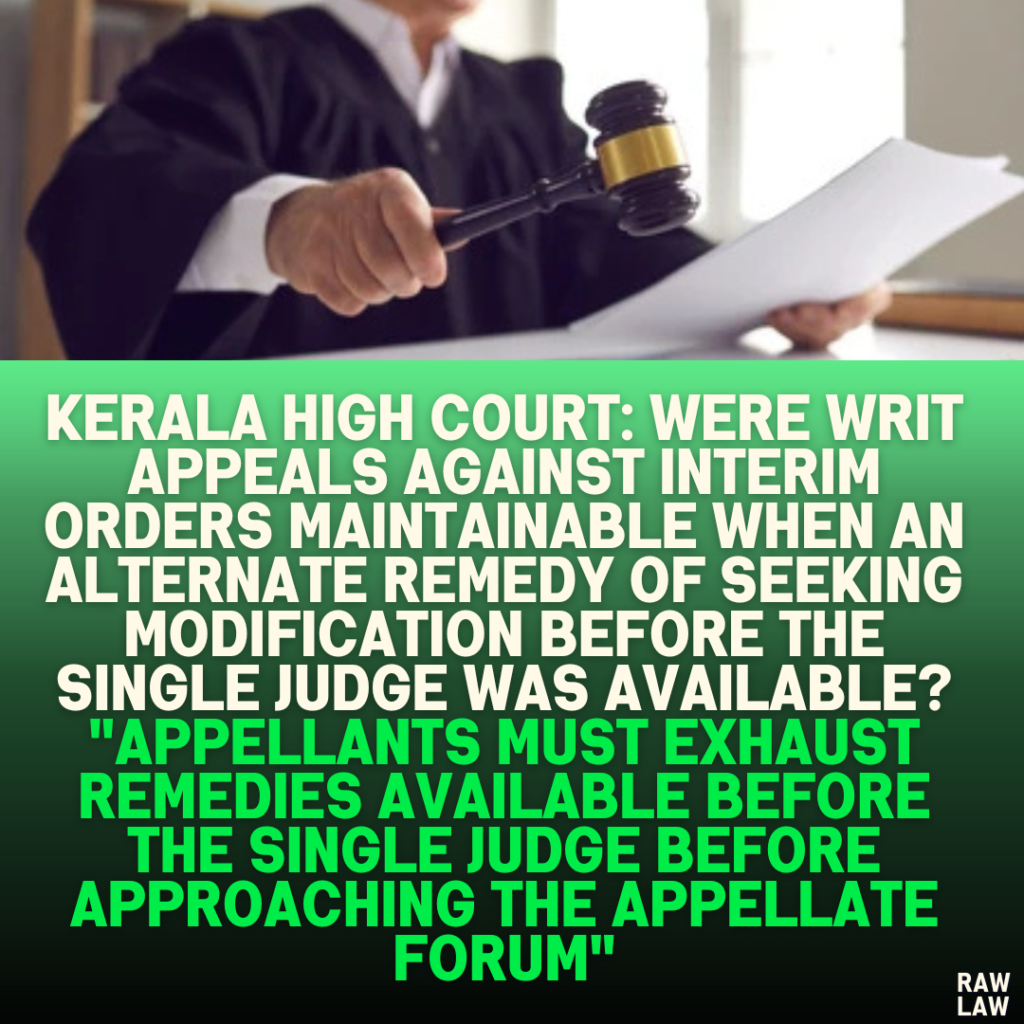Court’s Decision:
The Kerala High Court dismissed a series of writ appeals filed by medical colleges and other appellants. The appeals were withdrawn at the appellants’ request, without prejudice to their right to approach the learned Single Judge to seek modification of the interim orders that were impugned. The dismissal was based on the precedent set in Writ Appeal No. 129/2024 and a connected case.
Facts:
- The appeals originated from interim orders issued by the learned Single Judge in several writ petitions.
- The appellants, mainly medical colleges, challenged these orders, asserting that the directions adversely affected their functioning.
- Instead of seeking modification of these orders before the Single Judge, the appellants directly filed writ appeals before the Division Bench.
- During the hearing, the appellants requested withdrawal of the appeals to preserve their right to approach the learned Single Judge for relief.
Issues:
- Validity of the Appeals: Whether the writ appeals against interim orders were maintainable when an alternate remedy of seeking modification before the learned Single Judge was available.
- Prejudice to Rights: Whether the dismissal of the appeals would prejudice the appellants’ substantive rights to challenge the interim orders.
Petitioner’s Arguments:
- The appellants argued that the interim orders caused substantial hardship and warranted urgent intervention by the Division Bench.
- They contended that the appeals were filed in good faith due to the critical impact of the orders.
- During the hearing, they sought to withdraw the appeals while retaining the right to challenge the orders before the Single Judge.
Respondent’s Arguments:
- The respondents maintained that the appellants should have first exhausted the remedy of seeking modification before the Single Judge instead of directly filing writ appeals.
- They asserted that the appeals were procedurally premature and unnecessary at this stage.
Analysis of the Law:
- Principle of Exhaustion of Remedies:
- The appellate jurisdiction is generally invoked only after remedies at the trial level have been exhausted.
- The interim orders issued by the learned Single Judge could be modified by the same court if sufficient grounds were presented.
- Precedents:
- The court relied on the legal framework established in Writ Appeal No. 129/2024 and its connected case, which underscored the necessity of following procedural hierarchy.
- The judgment in these cases affirmed that dismissal of writ appeals does not bar appellants from approaching the original forum for relief.
- Appellate Court’s Role:
- The appellate court emphasized that its primary role is to ensure that lower court decisions are reviewed appropriately, not to serve as the first forum for grievances against interim orders.
Precedent Analysis:
- Writ Appeal No. 129/2024:
- The court had previously held that appellants must exhaust remedies available before the Single Judge before approaching the appellate forum.
- It clarified that procedural lapses in bypassing the original court could lead to dismissal but would not bar future remedies.
Court’s Reasoning:
- Efficient Use of Judicial Resources:
- Allowing the appeals to proceed would be redundant as the Single Judge had jurisdiction to modify or vacate the interim orders.
- The court sought to prevent unnecessary escalation of disputes to the appellate level.
- Non-Prejudicial Withdrawal:
- The court ensured that dismissal of the appeals would not prejudice the appellants’ rights to seek modification or other relief from the Single Judge.
- The dismissal was structured to safeguard substantive justice while upholding procedural propriety.
- Judicial Discipline:
- The dismissal reinforces the principle that litigants must follow the proper procedural channels to resolve disputes.
- The court underscored the importance of respecting the procedural hierarchy to maintain judicial efficiency.
Conclusion:
The Kerala High Court dismissed the writ appeals as withdrawn, without prejudice to the appellants’ right to seek modification of the interim orders from the learned Single Judge. The decision aligns with legal precedents and ensures that appellants retain their substantive rights while adhering to procedural requirements.
Implications:
- Encouragement of Procedural Discipline:
- The ruling promotes the use of appropriate forums for interim relief, reducing unnecessary appellate intervention.
- Judicial Economy:
- By dismissing premature appeals, the court prevents wastage of judicial resources and reinforces the need for efficient case management.
- Guidance to Litigants:
- The judgment serves as a reminder for litigants to exhaust remedies at the trial court level before seeking appellate review.




Pingback: Bombay High Court Quashes Charity Commissioner’s Directive to Remove Terms Like ‘Eradication of Corruption’ and ‘Human Rights’ from Trust Names, Cites Lack of Legal Authority and Upholds Broad Scope of Charitable Purposes - Raw Law